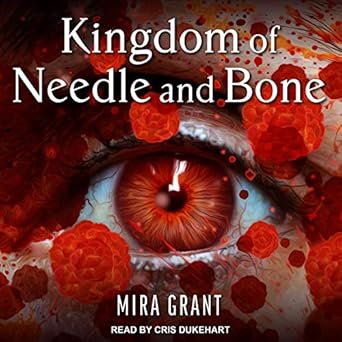
![]() Kingdom of Needle and Bone by Mira Grant
Kingdom of Needle and Bone by Mira Grant
Lisa Morris, Patient Zero, is only eight years old when she contracts a mutated and vicious form of measles, infects hundreds of other people while visiting Disney World, and dies. The disease races across the planet, killing millions, because “the virus always spreads.”
Lisa’s Aunt Isabella, a pediatrician who feels guilty about Lisa’s death, goes on a crusade to protect those who haven’t yet been exposed to the virus. Her pediatric clinic is targeted by anti-vaxxers, but she continues to champion — and try to explain — herd immunity. Then her youngest sister discovers something even more terrifying than the obvious initial effects of the new virus, making Isabella change course and launch an elaborate plan that may not be entirely ethical but just may save the human race.
Mira Grant’s novella Kingdom of Needle and Bone (2018) asks some interesting questions. What would happen if the human race lost its herd immunity and was in danger of being exterminated by mutating viruses? And if that happened, what would be required to get that immunity back again? And how could we do this without revoking each person’s autonomy over their own body? Grant shows us that these are not easy questions, that people will have different views, and that ethical lines may need to be crossed.
 Unfortunately, much of the novella reads like an angry tirade against anti-vaxxers. Grant gives us numerous lectures about herd immunity, while also laying out the philosophical arguments in favor of bodily autonomy. Grant also throws in a few swipes at those who claim that their religious beliefs bar vaccinations, without explaining the religious concerns. Generally, Grant discusses interesting ideas, but sometimes makes them difficult to evaluate because they are delivered by unpleasant characters who are more interested in beating down their opponents than having thoughtful discourse.
Unfortunately, much of the novella reads like an angry tirade against anti-vaxxers. Grant gives us numerous lectures about herd immunity, while also laying out the philosophical arguments in favor of bodily autonomy. Grant also throws in a few swipes at those who claim that their religious beliefs bar vaccinations, without explaining the religious concerns. Generally, Grant discusses interesting ideas, but sometimes makes them difficult to evaluate because they are delivered by unpleasant characters who are more interested in beating down their opponents than having thoughtful discourse.
In fact, that’s the problem with the entire novella — it is like a brick to the head and is more likely to offend than persuade. We are avid supporters of Grant’s purpose here — to persuade people to vaccinate their children — but when characterization and description take a back-seat to the agenda, it’s hard to view this novella as much more than a piece of propaganda, and that isn’t going to help the cause.
There’s a surprising (but not completely unforeseen) twist at the end of Kingdom of Needle and Bone. There must be a sequel coming and, though there were things we didn’t like about this story, we’d both like to know what happens next.
Kat listened to the Tantor Audio’s edition of Kingdom of Needle and Bone which is 3 hours long. Cris Dukehart, the narrator, does a nice job.




I was excited when I read the first paragraph of this post because this is such a timely topic… and so disappointed when I got to the end of the review.
I wish this talented writer had focused more on the story and the characters and delved more deeply into the different points of view. It reminds me of “Vigilance,” by RJ Bennett; an angry propaganda piece by one of my favorite writers.
*looks at review and book almost two years later*
well, the description of “preachy” aged like milk. turns out this is in fact exactly what happens.
Hi Lizzie! It’s really interesting to look back at this novella in the context of COVID. Like we said, we totally agree with her views and purpose for writing it and, in the near future, it may become even more relevant when we finally get a vaccine for COVID-19.
Our issue was that the novella feels more like a manifesto than a story. I think I would have liked it better if the story had been longer and there was more time to focus on character and setting in addition to the important message. I think that a less combative approach might make it more palatable to those who don’t, at least at first, share the author’s views.